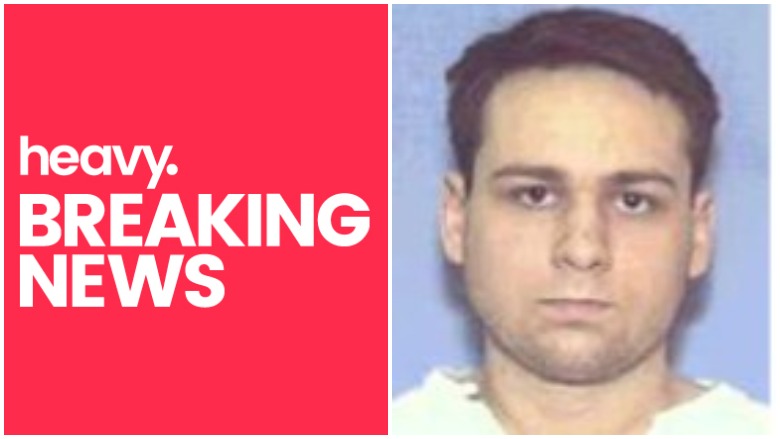
White supremacists John William King, Lawrence Russell Brewer and Shawn Allen Berry scoped out 49-year-old James Byrd Jr. in the very early morning hours of June 7, 1998 in Jasper, Texas.
Byrd, an African-American man, was hitchhiking, police said, along Martin Luther King Drive. Stopping their 1982 gray Ford truck, they picked up Byrd and then viciously beat him. With a 24-foot logging chain wrapped around his ankles, they fastened Byrd to the back of the truck bed and dragged him more than three miles along Huff Creek Road.
Byrd, who reports say was conscious for much of the lynching-by-dragging, died when he was decapitated along the murderous route. Scores of Byrd’s body parts were strewn along the country road.
The killers dumped what was left of Byrd at a black church cemetery just outside of Jasper.
In 1999, Brewer was found guilty of capital murder and was put to death in 2011. Berry cooperated with authorities and received a life sentence. King was described as the ringleader.
On Wednesday night, April 24, 2019 just before 7 p.m., King, who has been on Death Row for two decades, was executed in the death chamber at the Texas State Penitentiary at Huntsville.
King did not open his eyes, he made very little movement, he was asked if he had a final statement and he said, “No.” He took a single deep breath, exhaled and at 6:56 p.m., was killed by lethal injection. He was pronounced dead a few minutes later, Texas Department of Criminal Justice communications director Jeremy Desel said just moments after the execution.
Friends of King’s were there to witness the execution.
And so were two of James Byrd Jr.’s sisters and his niece.
Clara Byrd Taylor said they witnessed the “peaceful and dignified execution” of the man who committed a heinous and “inhumane murder, a modern-day lynching.” She said King had a “deeply ingrained hatred of blacks” with racist tattoos and “hateful rhetoric …who wanted to make a name for himself” as part of a white supremacist group. She said her brother was “shown no mercy,” and described his dying body being dragged “like sack of potatoes.” She said King “showed no remorse then and showed no remorse tonight.”
Byrd Taylor said her bother, who would have been 70 and able to enjoy watching his children and grandchildren grow” if not for King. She said Byrd’s “legacy is one of peace and no violence.” She said his death led to hate crime laws to be enacted. But added, “laws cannot change the hearts of man.”
Byrd Taylor said King never looked at them, showed no remorse and in fact, she found his demeanor to be a final “act of defiance.”
King, 23 at the time of the murder and when executed Wednesday night, was 44. He’d unsuccessfully appealed his conviction, but a stay of execution came a week ago, albeit a temporary one. Monday, the Texas Board of Pardons and Paroles denied his plea to receive either a commutation of his sentence or a 120-day reprieve.
Jasper priest Father Ron Foshage was praying that King would be remorseful and “asks for forgiveness.”
According to media witness from KFDM, “King didn’t speak before his execution but left a short written statement: ‘Capital punishment, them without the capital get the punishment.'”
Here’s what you need to know:
1. ‘Three Robed Riders Came Straight Out of Hell & Instead of a Rope, They Used a Chain, & Instead of Horses, They Had a Pick-Up Truck’
The details are horrific. And in court, the evidence told a story too. Byrd was dragged for three miles and for half of those miles, he was conscious, forensic evidence showed. What he suffered is unimaginable.
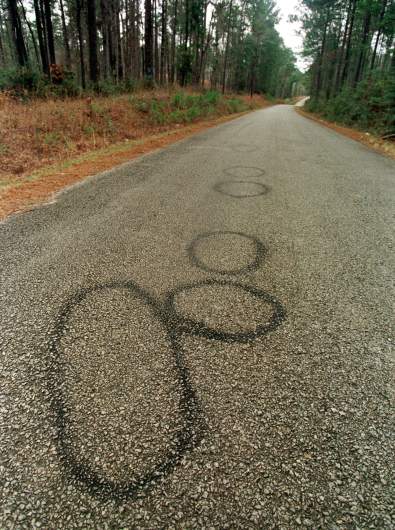
Painted circles that marked evidence in the dragging death of James Byrd Jr. on the county road outside Jasper, Texas.
Trusting, Byrd took a ride from Berry, Brewer and King.
From reports and court records: Instead of taking Byrd where he wanted to go, they took him to the logging road outside of town, beat him, defecated and urinated on him and then chained him by his ankles to the truck and started driving. Though Brewer would claim Byrd’s throat was cut by Berry, forensics showed Byrd was trying to keep his head up as he was mercilessly dragged but his head and arm were severed when his body hit a culvert. The men took the remains of Byrd’s body and dumped them in a African-American church cemetery. They then went to a cookout.
These details will be disturbing for most and come from appeal case file summaries:
“Dr. Tommy Brown, a forensic pathologist, testified that he received Byrd’s head, neck, and arm separately from the main torso. The autopsy revealed extensive injuries all over Byrd’s body. Nearly all of Byrd’s anterior ribs were fractured. He suffered massive brush burn abrasions over most of his body. Both testicles were missing and gravel was found in the scrotal sac. Both knees and part of his feet had been ground down, his left cheek was ground to the jawbone, and his buttocks were ground down to the sacrum and lower spine. Some of his toes were missing and others were fractured. Large lacerations of the legs exposed muscle. But his brain and skull were intact, exhibiting no lacerations, fractures, or bruises.
Brown concluded that the lacerations and abrasions around Byrd’s ankles were consistent with the ankles having been wrapped by a chain and that the abrasions all over Byrd’s body were consistent with him being dragged by his ankles over a road surface. Red regions around the area where Byrd’s upper and lower body separated indicated that Byrd’s heart was still pumping and that he was alive when his body was torn apart by the culvert. Therefore, Brown determined that the cause of death was separation of the head and upper extremity from the rest of the body. Some of the wound shapes and patterns indicated that Byrd was conscious while he was being dragged and was trying to relieve the intense burning pain by rolling and swapping one part of his body for another. Also, the absence of injuries to Byrd’s brain and skull suggested that he was trying to hold his head up while being dragged.”
Byrd’s decapitated head was found the next morning and police found a tool with “Berry” engraved and a lighter inscribed with “Possum”, King’s nickname. Along the road, investigators discovered 80 separate locations with Byrd’s remains strewn. Police knew the men were white nationalists and the murder was swiftly deemed a hate crime.
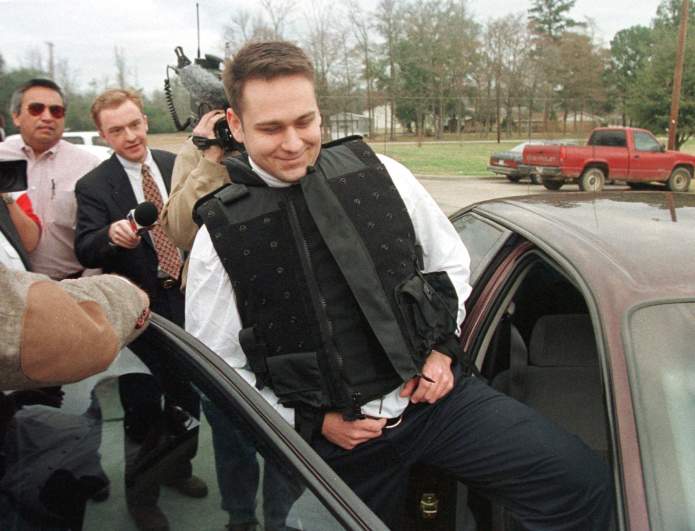
Accused murderer John William “Bill” King smiles as he enters a sheriff’s car that will transport him to the Jasper County Courthouse.
Then-Jasper County prosecuting attorney Pat Hardy described the murder as a lynching: “Three robed riders came straight out of hell…. Instead of a rope, they used a chain, and instead of horses, they had a pick-up truck.”
Each man was convicted of capital murder.
2. King Was an Avowed White Nationalist & Racist. Nicknamed Possum, King Claimed he was the Exalted Cyclops of White Supremacist Group Confederate Knights of America
In an appeal in 2017, King’s lawyer said his client’s trial lawyers should have told the jury that King was a racist, yes, but was living in a “fantasy” with “grandiose braggadocio” his lawyer argued. King, who dropped out of high school in the 10th grade, was an open white supremacist. For work, according to Death Row records, he was a laborer.
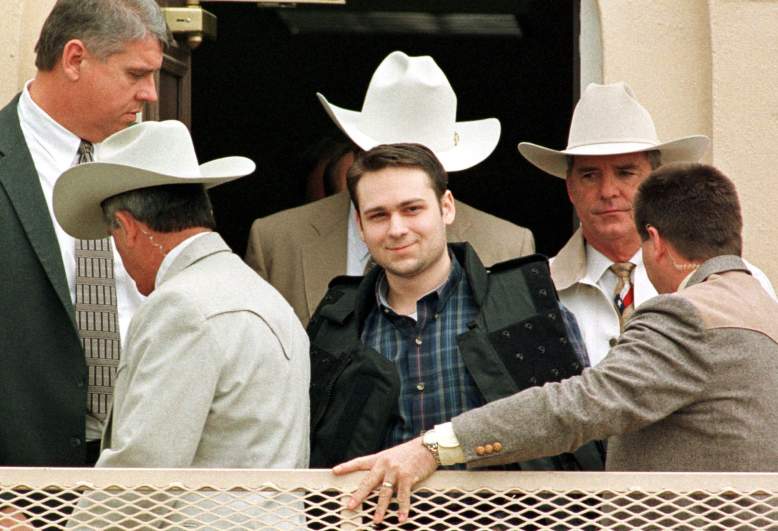
White supremacist John William King grins as he is led from the Jasper County Courthouse after a jury sentenced him to death in his capital murder trial.
King was arrested in 1997 on a burglary charge. While locked up, he joined the Ku Klux Klan affiliate group called he Confederate Knights of America. King wanted to create a white power group fashioned after the CKA in Jasper. He referred to himself as the white power group’s exalted cyclops.
King was covered in racist tattoos including a lynching scene, a Nazi symbol, the words Aryan Pride inked on his torso, and the symbol of the CKA. During the trial, he wrote “Seriously, though, Bro, regardless of the outcome of this, we have made history and shall die proudly remembered if need be. . . . Much Aryan love, respect, and honor, my brother in arms. . . . Possum.” On his lighter, which police wold find among other items identifying the killers, his prison nickname was crudely etched PoSSum, rhe double S’s uppercase as in the Nazi SS.
In a case summary of King’s failed appeal of his conviction, a more detailed list of the tattoos is recorded.
“woodpecker in a Ku Klux Klansman’s uniform making an obscene gesture; a patch incorporating KKK, a swastika, and Aryan Pride; and a black man with a noose around his neck hanging from a tree. [King] had on occasion displayed these tattoos to people and had been heard to remark, See my little ni**er hanging from a tree.”
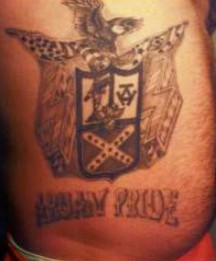
But in a 2002 Washington Post column on prison rapes, it’s reported that when King was jailed for the burglary charge, a white supremacist prison gang devised a plot to get King to join their cause.
“When King arrived at the prison, a group of white supremacists reportedly conspired with the guards to place King in the ‘black’ section of the prison. At just 140 pounds, King was unable to defend himself against a group of black prisoners who repeatedly gang-raped him. This was exactly what the white power gang wanted. Filled with hatred, King was easily recruited into their group for protection. Over the remainder of his sentence, they filled King’s head full of hatred for blacks. When he was released, John King unleashed that pent-up hatred on James Byrd.”
And while the column reads that that was no excuse for Byrd’s tortuous murder, it provided context. And proved, inadvertently or otherwise, that this crime was indeed a crime of hate.
3. The Byrd Family Met With Pres. Bill Clinton Who Vowed to Help Bring About Hate Crime Legislation. The Family Created the Byrd Foundation for Racial Healing
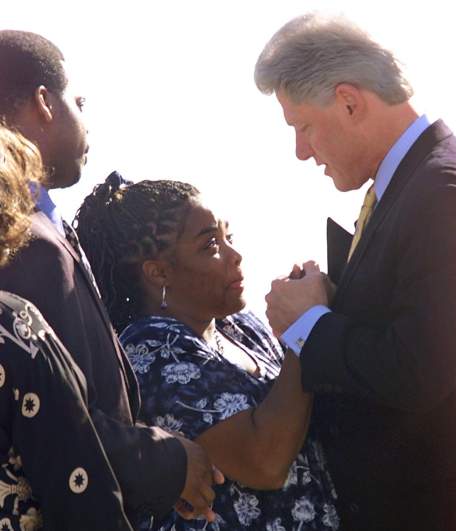
GettyPresident Bill Clinton speaks to Renee Mullins, daughter of James Byrd Jr. in 1999 in Austin, Texas. Clinton promised Mullins that he would help pass hate-crime legislation.
Renee Mullins, James Byrd’s daughter met with then-Pres. Bill Clinton in 1999 where the president promised her he’d work to see hate crime legislation passed.
It would take years, but in 2009, a law was enacted to strengthen penalties and made hate crimes federal crimes in the name of Byrd and Matthew Shepard, who was brutally beaten, tortured, and left to die outside Laramie, Wyoming by killers Aaron McKinney and Russell Henderson. The two are serving two consecutive life sentences.
As a way to give meaning to Byrd’s death, the family created the Byrd Foundation for Racial Healing to provide “public enlightenment and education,” the “advancement of racial healing,” and bring “awareness to the consequences of racial hatred and hopefully reduce the number of racially motivated crimes.”
Dennis Rodman paid for Byrd’s funeral. Don King paid for the Byrd children’s education. Two films were made about the murder. And the majority black town where most live in poverty has never fully recovered.
4. With Byrd’s Sisters & Shepard’s Mother With Him at the White House in 2009, Pres. Obama Signed Into Law The Matthew Shepard and James Byrd, Jr., Hate Crimes Prevention Act
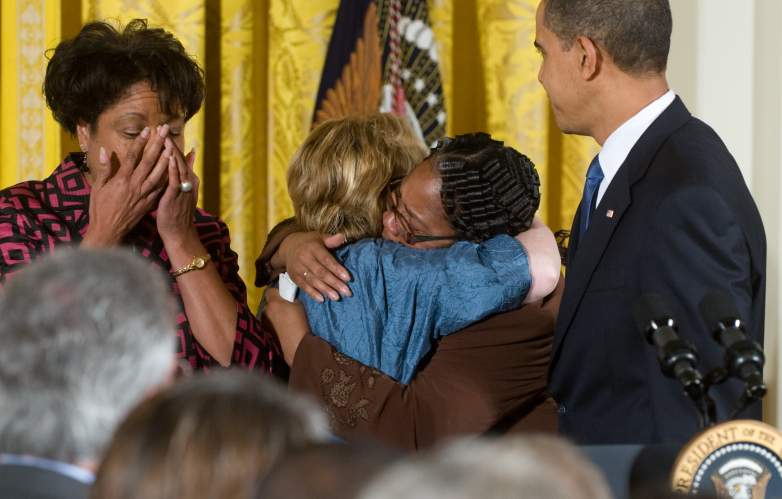
GettyLouvon Harris (L) stands alongside her sister Betty Byrd Boatner (2nd R), both sisters of James Byrd, Jr., as she embraces Judy Shepard (2nd L), mother of Matthew Shepard, as President Barack Obama looks on after Obama spoke in honor of the enactment of the Matthew Shepard and James Byrd, Jr., Hate Crimes Prevention Act in 2009.
In 1998, gay college student Matthew Shepard was beaten to death. In 1998, African-American James Byrd Jr was dragged to his death. Eleven years later, the Matthew Shepard and James Byrd, Jr., Hate Crimes Prevention Act was signed into law.
With Pres. Barack Obama was Matthew Shepard’s mother Judy and Byrd’s sisters Louvon Harris and Betty Byrd Boatner. Obama spoke about the importance of signing the hate crime bill into law. The act toughened penalties and expanded protections against crimes designed to intimidate as well as harm.
Obama said hate crimes are meant to not only “break bones but break spirits…not only to inflict harm but too instill fear.”
King was sentenced to death for the murder of Byrd. He’s scheduled to be executed in the Huntsville Death Chamber at 7 p.m. Wednesday, barring another stay.
5. A Few Members of the Byrd Family Will Witness The Execution & Others in the Family Were Opposed to the Death Penalty. Byrd’s Sister Wants ‘Justice.’ Meanwhile, Texas Has 290 on Death Row
Louvon Byrd Harris said she and other Byrd family members will be at the execution, though some members have said in the past an execution won’t bring Byrd back. Still, Harris said the execution of the racist murderer “will be a message to the world that when you do something horrible like that, that you have to pay the high penalty.”
Harris told The Washington Post “justice will be served” Wednesday in Huntsville.
In an interview with media after the execution of Brewer, Byrd’s son Ross said “You can’t fight murder with murder,” and his daughter Renee said she would have preferred the men be given life sentences.
Harris and her sisters and a niece, who will be in the gallery at the execution chamber, want to see justice.
“They were determined to treat him like an animal. They were a danger to society. That’s when we start changing our opinion about the death penalty,” the Post quoted Harris as saying.
Texas has been executing convicted criminals since 1819, first by hanging, then by electrocution and in 1977, by lethal injection.
The state has executed 560 people since 1982, accounting for more than one-third of the 1,493 executions nationwide since 1977. In 2018, the State of Texas put 13 people to death and it’s responsible for two of the three executions nationwide so far in 2019.
Five on Death Row are scheduled to die before September and there are currently 290 prisoners awaiting their execution day in the Polunsky Unit’s Death Row at Huntsville.
